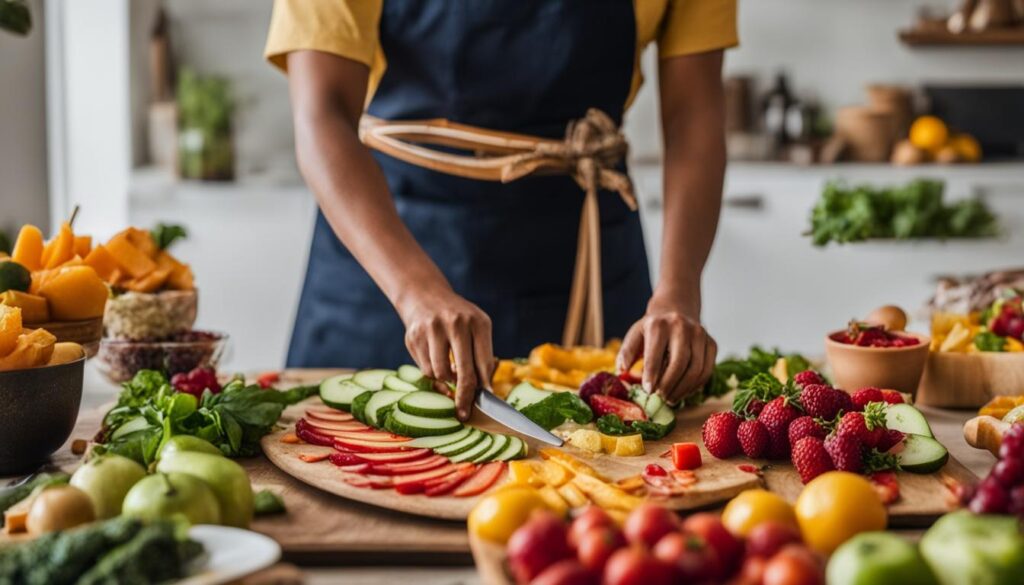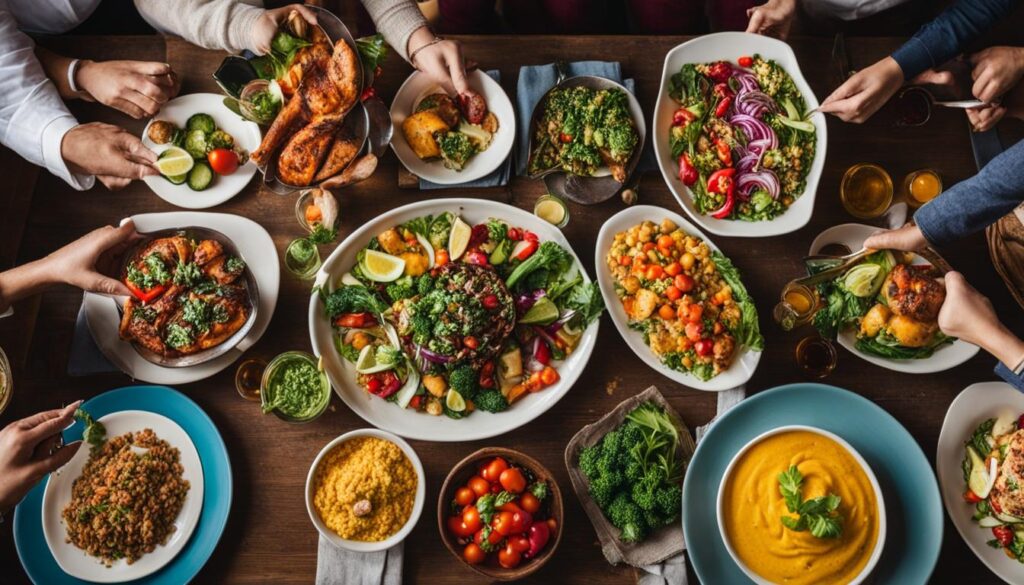As someone who values their health and well-being, I understand the challenges of balancing a social life with a healthy diet. Navigating social events can often lead to indulging in unhealthy foods and derailing our progress. But fear not! With the right strategies and a mindful approach, it is possible to enjoy social gatherings while maintaining your commitment to healthy eating.
In this Social Eating Survival Guide, I will share valuable tips and insights that will help you strike a balance between your social life and your diet. From prepping for events to making smart choices, recovering afterwards, and practicing mindfulness, you’ll discover sustainable eating habits that will enhance your overall well-being.
Key Takeaways:
- Being mindful of your eating habits can help you make conscious choices and stay on track with your health goals.
- Pre-game by eating a balanced meal beforehand, working out, staying hydrated, and communicating your dietary preferences.
- During the party, take a lap before committing to snacks, fill up on vegetables and fruits, choose healthier carbohydrate options, and manage alcohol consumption.
- After the festivities, focus on recovery by drinking water before bed, getting back into a healthy routine, and prioritizing sleep.
- When dining out during the holidays, be mindful of your choices, opt for healthier options, and avoid excessive salt and fat.
The Pre-Game: Setting Yourself Up for Success
To set yourself up for a successful social event, it’s essential to prioritize your pre-game routine. By taking a few mindful steps beforehand, you can make healthier choices and stay on track with your health goals. Here are some valuable tips to help you prepare for the gathering:
- Eat a Balanced Meal: Before heading out, make sure to fuel your body with a nutritious and balanced meal. This will prevent overindulgence and make it easier to resist unhealthy options at the event.
- Workout Beforehand: Incorporating a workout session before the social event can have numerous benefits. Not only will it boost your metabolism, but it will also make you more conscious of your food choices throughout the day.
- Stay Hydrated: It’s crucial to stay hydrated, especially if you anticipate consuming alcohol or salty foods at the gathering. Remember to drink plenty of water throughout the day to help flush out toxins and maintain optimal hydration.
- Communicate Your Dietary Preferences: If you have specific dietary preferences or restrictions, don’t hesitate to communicate them with the host. This will ensure that there are suitable options available for you to enjoy.
- Bring Your Own Drink: Consider bringing your own beverage to the event. Whether it’s a bottle of organic sulfite-free wine or a non-alcoholic option with limited sugar content, having a drink that aligns with your preferences will give you peace of mind.
“By following these pre-game tips, I can set the stage for a healthier and more enjoyable social event. Prioritizing my well-being allows me to make conscious choices and still have a great time with friends and family.”

Continue reading for helpful strategies to navigate the party and make healthier choices during the gathering.
Navigating the Party: Making Healthy Choices
When attending a party or gathering, it’s important to make mindful choices to maintain a healthy lifestyle. By following these tips, you can navigate social events while still prioritizing your well-being.
Taking a lap before committing
Before indulging in snacks or treats, take a lap around the venue to assess your options. This allows you to make more mindful choices and avoid impulsive decisions that may not align with your health goals.
Filling up on vegetables and fruits
Start by filling your plate with nutrient-dense vegetables and fruits. These options not only provide essential vitamins and minerals but also help you feel more satisfied, reducing the likelihood of overindulging in less healthy options.
Choosing healthier carbohydrate options
When it comes to carbohydrates, opt for healthier choices such as whole-grain options or starchy vegetables. These provide a source of sustained energy and offer more nutritional value compared to refined carbohydrates.
Avoiding dishes with unknown ingredients
If you’re unsure about certain dishes, don’t hesitate to ask the host for clarification on ingredients. By avoiding dishes with unknown ingredients, you can make informed choices and avoid any potential allergens or dietary restrictions.
Managing alcohol consumption
Alcohol consumption can contribute to excess calories and compromise your health goals. To manage alcohol consumption, drink water between cocktails to stay hydrated and prevent overindulgence.
Opting for plant-based alternatives
When it comes to food options, consider choosing plant-based alternatives. Grilled tofu or vegetables can provide delicious and nutritious options that are lower in saturated fats and cholesterol.
Practicing mindful eating
Be mindful of your hunger and fullness cues throughout the event. Stop eating once you’re satisfied, rather than consuming food mindlessly. To satisfy your sweet tooth, consider sharing desserts with others to practice portion control.

By following these tips, you can make healthier choices at social gatherings without feeling deprived. Remember, balance is key, and making conscious choices that align with your health goals will help you maintain a sense of well-being.
The After-Party: Recovery and Moving Forward
Now that the festivities are over, it’s time to prioritize your recovery and get back into a healthy routine. Here are some key steps to help you bounce back and maintain your well-being.
1. Hydrate for Vitality
After a night of celebrations, it’s essential to rehydrate your body by drinking a large glass of water before bed. This not only aids in hydration but also helps combat the potential negative effects of alcohol consumption. Give your body the boost it needs to start fresh the next morning.
2. Nourish with Whole Plant-Based Foods
Replenish your body with nutrient-dense whole plant-based foods the day after the event. Load up on fresh fruits, vegetables, whole grains, legumes, and nuts to provide your body with essential vitamins, minerals, and antioxidants. These foods will help restore balance and aid in your recovery.
3. Practice Self-Compassion
Remember, it’s okay to indulge and enjoy yourself during the event. Don’t be too hard on yourself if you strayed from your usual healthy choices. Practice self-compassion and let go of any guilt or negative feelings. Embrace the concept of balance and allow yourself the freedom to enjoy special occasions guilt-free.
4. Resume Physical Activity
Get back into your exercise routine to re-energize your body and mind. Engage in activities that you enjoy, whether it’s going for a run, attending a fitness class, or taking a leisurely walk. Physical activity boosts endorphins, relieves stress, and helps you regain focus on your health goals.
5. Prioritize Sleep for Restoration
Ensure you prioritize sleep as part of your recovery process. Adequate sleep is vital for your overall well-being and allows your body to restore and repair. Aim for 7-9 hours of quality sleep each night to feel refreshed and ready to tackle the day.

“Replenish your body with nutrient-dense whole plant-based foods the day after the event.”
By following these steps, you can recover from the celebrations and get back on track with your health goals. Remember, balance and self-care are essential for maintaining a healthy lifestyle.
Dining Out During the Holidays: Making Smart Choices
During the holiday season, eating out becomes more frequent, and it can be challenging to maintain a healthy eating pattern. However, by understanding the nutritional value of restaurant meals and following some simple tips, you can make smarter choices and stay on track with your health goals.
Challenges of Eating Out
When dining out during the holidays, there are a few challenges to be mindful of. Restaurants often offer larger portion sizes, dishes high in salt and fat, and tempting desserts and drinks. These factors can make it difficult to choose healthier options and maintain a balanced diet.
Nutritional Value of Restaurant Meals
Understanding the nutritional value of the meals offered in restaurants can help you make informed choices. Many restaurants now provide nutrition information on their menus or websites, allowing you to select options that fit your dietary needs. By paying attention to the calorie, fat, and sodium content, you can choose meals that align with your health goals.

Tips for Eating Out
Here are some tips to help you make healthier choices when dining out during the holidays:
- Choose steamed, broiled, or baked options instead of fried or breaded dishes.
- Ask for dressings, sauces, and condiments to be served on the side, allowing you to control the amount you consume.
- Opt for grilled or steamed vegetables as a side dish.
- Be mindful of portion sizes and consider sharing a meal or taking leftovers home.
Avoiding Excessive Salt and Fat
Excessive salt and fat in restaurant dishes can contribute to chronic diseases such as high blood pressure and heart disease. To avoid consuming excessive amounts, choose dishes that are not overly seasoned or cooked with heavy sauces. Additionally, try to limit your intake of fried foods and opt for lean protein sources like grilled chicken or fish.
Being Mindful While Eating
Practicing mindfulness can help you make smarter choices when dining out. By paying attention to your hunger and fullness cues, you can avoid overeating. Take your time to savor each bite and enjoy the flavors of your meal. Being mindful also involves listening to your body and stopping when you feel satisfied, rather than eating until you’re uncomfortably full.
“When dining out during the holidays, remember to be mindful of your choices, focus on nutrient-rich options, and enjoy the experience without guilt.” – Anonymous
By using these tips and being conscious of your choices, you can navigate dining out during the holidays while maintaining a healthy eating pattern. Remember, it’s about finding a balance between enjoying the festivities and taking care of your well-being.
Staying Balanced as the Host: Providing Healthy Options
If you’re hosting a gathering, it’s a fantastic opportunity to not only create a welcoming atmosphere but also offer your guests healthier food options. By prioritizing the inclusion of fruits and vegetables, lean protein choices, and lighter party foods, you can promote a balanced approach to eating and help your guests maintain their health goals while still enjoying social events.
When planning your menu, aim to include a wide variety of colorful fruits and vegetables. These nutritious options not only add vibrant flavors and textures to your spread but also provide essential vitamins, minerals, and dietary fiber. Consider serving a colorful fruit platter or a refreshing vegetable tray with a selection of dips.
Additionally, it’s essential to provide lean protein options for your guests. Grilled chicken skewers, shrimp cocktail, or veggie-based protein alternatives such as tofu or tempeh can be excellent choices that cater to a range of dietary preferences. These options offer a good source of protein while avoiding excessive saturated fats.
Avoiding excessive sugar and fat is crucial when offering healthy options. Opt for homemade dips or sauces with reduced sugar content and utilize healthier cooking methods like roasting or grilling instead of deep-frying. This way, you can maintain the flavorful appeal of your dishes while promoting a balanced approach to eating.
Incorporating a variety of whole grain-based snacks, such as whole wheat crackers or pita bread, can provide additional fiber and nutrients. You can also consider incorporating plant-based protein sources like hummus or bean dips for a vegetarian-friendly option.
To ensure your guests can make informed choices, consider labeling any potential allergens or dietary restrictions on your food spread. This step shows thoughtfulness and consideration for your guests’ needs, making them feel valued and included.
“Hosting a gathering allows me to connect with my loved ones while promoting a healthy and balanced approach to eating. By offering fruits, vegetables, lean protein, and lighter options, I’m able to create an enjoyable experience for everyone.”
Remember, as the host, you have the power to influence the food choices and experiences of your guests. By providing healthy options, you can contribute to their well-being and help them stay on track with their health goals, all while celebrating together.
Healthy Food Options Table
| Food Category | Examples |
|---|---|
| Fruits | Fresh berries, melon slices, sliced apples and pears, fruit skewers |
| Vegetables | Crudité platter with carrot sticks, cucumber slices, bell pepper strips, cherry tomatoes, and hummus dip |
| Lean Protein | Grilled chicken skewers, shrimp cocktail, marinated tofu cubes |
| Lighter Party Foods | Whole grain crackers, baked tortilla chips, air-popped popcorn |
| Dips and Sauces | Homemade guacamole, Greek yogurt-based dips, tomato salsa |
The Festive Time of Year: Striving for Balance
The festive season is a time of joy and celebration, but it can also bring challenges to maintaining a balanced lifestyle. With tempting treats and busy schedules, it’s easy to overconsume calories and neglect the essential nutrients our bodies need. In addition, the lack of exercise during this time can further disrupt our equilibrium. However, with the right strategies, we can strive for balance and enjoy the festivities while prioritizing our well-being.
Planning Meals and Snacks
One effective strategy for maintaining balance during the festive season is to plan meals and snacks ahead of time. By taking a few moments to think about what you’ll eat throughout the day, you can make healthier choices and avoid impulsive overeating. Incorporate nutrient-dense foods like fruits, vegetables, lean proteins, and whole grains into your meals to ensure you’re getting the necessary vitamins and minerals.
Mindful Portion Sizes
Mindful eating, which involves paying attention to how much we consume and listening to our body’s hunger and fullness cues, is another crucial strategy for maintaining balance. Mindfully serving yourself appropriate portion sizes can prevent overconsumption and help you enjoy your favorite holiday dishes without guilt. Remember, it’s okay to indulge in moderation, as long as you’re mindful of your choices.
Choosing Healthier Options
Amidst the abundance of indulgent treats during the festive season, it’s important to prioritize healthier options. Opt for whole foods and minimize your intake of processed foods, which often contain excessive amounts of calories, salt, and unhealthy fats. Set a good example by providing nutrient-rich dishes at gatherings, such as colorful salads, roasted vegetables, and lean protein options.
Being Alcohol Aware
Alcoholic beverages are often plentiful during the festive season, but excessive consumption can interfere with our overall well-being. To maintain balance, be mindful of your alcohol intake and choose lower-calorie options. Drink water between alcoholic beverages to stay hydrated and help pace yourself. If you prefer not to drink alcohol, there are plenty of delicious mocktails and non-alcoholic alternatives available that can still make you feel festive.
| Challenges of the Festive Season | Strategies for Maintaining Balance |
|---|---|
| Overconsumption of calories | Plan meals and snacks ahead of time to make healthier choices and avoid overeating. |
| Underconsumption of nutrients | Incorporate nutrient-dense foods into your meals, such as fruits, vegetables, and lean proteins. |
| Lack of exercise | Find opportunities to stay active, even during busy times, by incorporating short workouts or engaging in active social activities. |
By implementing these strategies and staying mindful of your choices, you can navigate the festive season with balance and enjoyment. Remember, it’s about finding a sustainable approach that allows you to indulge in moderation while prioritizing your health. Celebrate the festivities while nurturing your well-being!
Busy Days and Healthy Choices
Having a busy schedule can make it challenging to prioritize your health, but with some planning and preparation, you can still make healthy choices on the go. Here are some tips to help you stay on track:
- Plan Your Meals: When you know you have a busy day ahead, take some time to plan and prepare your meals. This will help you avoid relying on unhealthy fast food or snacks. Pack a nutritious lunch filled with fruits, vegetables, and a source of protein to keep you satisfied throughout the day.
- Avoid Unhealthy Snacks: When you’re busy and on the move, it’s easy to reach for convenient but unhealthy snacks. Instead, keep a stash of nutritious snacks like nuts, seeds, or cut-up fruits and vegetables to munch on when hunger strikes.
- Stay Hydrated: It’s important to stay hydrated, especially on busy days when you’re constantly on the go. Carry a reusable water bottle with you and aim to drink water throughout the day. This will help keep your energy levels up and prevent dehydration.
- Make Wise Food Choices: When you’re eating out or grabbing food on the go, try to make wise choices. Opt for salads, grilled lean protein, or whole grain options when available. Avoid fried foods, sugary drinks, and excessive amounts of unhealthy fats.
“Planning and preparation are key when it comes to maintaining a healthy lifestyle on busy days. By packing a nutritious lunch, avoiding unhealthy snacks, staying hydrated, and making wise food choices, you can fuel your body properly even when time is limited.”
Remember, making healthy choices on busy days is all about being prepared and mindful of your choices. By incorporating these strategies into your routine, you can stay on track with your health goals even during hectic times.
| Challenge | Solution |
|---|---|
| Busy schedule | Plan meals and snacks in advance |
| Lack of time for cooking | Pack a healthy lunch and opt for quick, nutritious choices |
| Unhealthy snacking | Keep nutritious snacks on hand |
| Dehydration | Carry a reusable water bottle and drink water throughout the day |
| Poor food choices on the go | Opt for healthier options, such as salads and grilled proteins |
Mindful Indulgence: Enjoying Treats in Moderation
When it comes to indulging in treats, it’s all about finding a balance through mindful eating. Enjoying treats in moderation is a key aspect of maintaining a healthy lifestyle without feeling guilty or deprived. By being conscious of portion sizes, listening to hunger cues, and savoring the flavors, you can still satisfy your cravings without overindulging.
One of the fundamental principles of mindful indulgence is being aware of portion sizes. Rather than mindlessly consuming large quantities of treats, take the time to portion them out and savor each bite. This helps you appreciate the flavors and enjoy the treat without feeling the need to have more.
Listening to hunger cues is another essential aspect of mindful indulgence. Before reaching for a treat, ask yourself if you are truly hungry or if it is simply a craving. By tuning in to your body’s signals, you can differentiate between emotional craving and genuine hunger, helping you make more intentional choices.
Quote: “Mindful indulgence means being present in the moment, fully experiencing the pleasure of the treat while honoring your body’s needs.”
Savoring the flavors is an integral part of mindful eating. Slow down and pay attention to the taste, texture, and aroma of the treat. This not only enhances your enjoyment but also gives your brain time to register satisfaction, preventing the urge to overeat.
Avoid feelings of guilt and deprivation by focusing on balance. Remember that treats are a normal part of a healthy lifestyle and it’s okay to indulge occasionally. By removing the guilt associated with treat consumption, you can fully enjoy the experience without negative emotions.
Being mindful of your indulgences allows you to cultivate a healthy relationship with food. It’s about making intentional choices that align with your overall well-being and recognizing that treats can be enjoyed without derailing your progress. Embrace the practice of mindful indulgence and find satisfaction in moderation.
Being Mindful: A Key to Balance
Being mindful is a powerful tool in maintaining balance in your social eating habits. By practicing mindfulness, you can cultivate a deeper awareness of your eating patterns and make conscious choices that align with your health goals.
Mindful eating techniques involve being present in the moment and savoring each bite. By slowing down and fully engaging with your food, you can enhance the sensory experience and derive greater satisfaction from each meal.
Recognizing hunger and fullness cues is another essential aspect of mindful eating. By tuning in to your body’s signals, you can better understand when you are truly hungry or when you have had enough to eat. This helps prevent overeating and promotes a more balanced approach to food.
Moreover, practicing mindfulness can help reduce emotional eating. Rather than turning to food as a source of comfort or distraction, being present in the moment allows you to explore alternative strategies for managing emotions and stress.
“When we eat quickly and mindlessly, we miss out on the opportunity to truly enjoy our food and connect with our bodies.”
Embracing mindfulness in your social eating habits offers numerous benefits for your overall well-being. Studies have shown that practicing mindfulness can lead to weight loss, improved digestion, reduced stress levels, and enhanced mental clarity.
By being mindful, you can develop a healthier relationship with food and find joy in nourishing your body. It’s about bringing awareness and intentionality to each eating experience, allowing you to make choices that align with your values and support your health goals.
Mindful Eating Techniques:
- Eat slowly and savor each bite, paying attention to flavors, textures, and smells.
- Avoid distractions like screens or multitasking while eating.
- Listen to your body’s hunger and fullness cues.
- Engage all your senses while eating, noticing the colors, aromas, and sounds of your food.
- Practice gratitude for the nourishment your food provides.
Incorporating mindfulness into your social eating habits can transform your relationship with food and promote a greater sense of balance in your life.
| Benefits of Mindfulness in Social Eating Habits |
|---|
| Nourishes a healthier relationship with food |
| Supports weight management |
| Reduces emotional eating |
| Enhances digestion |
| Promotes stress reduction |
| Improves mental clarity |
Conclusion
In conclusion, maintaining a healthy and balanced approach to social eating at gatherings is possible with the right strategies. By prepping before events, making smart choices during parties, recovering afterwards, and being mindful throughout, you can stay on track with your health goals while still enjoying social interactions.
Remember, it’s about finding a sustainable balance and making conscious choices that align with your values and well-being. With these tips and strategies, you can navigate social events without compromising your health and maintain a sense of balance in your social eating habits.
By prioritizing mindful eating, staying hydrated, choosing nutrient-dense foods, and being aware of portion sizes, you can indulge in treats in moderation and avoid feelings of guilt or deprivation. It’s important to listen to your hunger and fullness cues, savor each bite, and embrace a mindful approach to indulgence.
Ultimately, maintaining a healthy social life doesn’t have to mean sacrificing your dietary goals. By implementing the strategies outlined in this social eating survival guide, you can strike a balance between enjoying gatherings with friends and family while still prioritizing your health and well-being. Remember, it’s the overall pattern of your eating habits that matters most, so be kind to yourself and strive for progress, not perfection.
FAQ
What can I do to set myself up for a successful social event?
It’s important to eat a balanced meal before attending the event, fit in a workout beforehand, stay hydrated, and communicate your dietary preferences to the host. You can also consider bringing your own drinks.
How can I make healthier choices at parties and gatherings?
Take a lap around the venue before committing to snacks, fill up on vegetables and fruits, choose healthier carbohydrate options, ask the host about ingredients, manage alcohol consumption, opt for plant-based alternatives, and practice mindful eating.
What should I do after a social event to get back on track?
Drink water before bed, focus on eating whole plant-based foods, practice self-compassion, resume physical activity, and prioritize sleep.
How can I make smart choices when dining out during the holidays?
Understand the nutritional value of restaurant meals, choose steamed, broiled, or baked options, have dressings and sauces on the side, opt for grilled or steamed vegetables, be aware of portion sizes, and be mindful while eating.
As a host, how can I provide healthy options for my guests?
Include a variety of fruits and vegetables, lean protein options, and lighter party foods. Avoid excessive sugar and fat in your dishes.
How can I maintain a balanced lifestyle during the festive season?
Plan meals and snacks ahead of time, be mindful of portion sizes, prioritize nutrient-dense options, be aware of alcohol intake, and strive for balance in your choices.
What can I do to make healthy choices on busy days?
Consider packing a healthy lunch, staying hydrated, and making wise food choices when on the go. Planning ahead can help you avoid impulsive decisions.
How can I indulge in treats without overindulging?
Be conscious of portion sizes, listen to hunger cues, savor the flavors, and enjoy treats in moderation. Balance and intentional choices are key.
What are the benefits of mindfulness in maintaining balance?
Mindfulness can help you become more aware of eating patterns, savor each bite, recognize hunger and fullness cues, and reduce emotional eating.

